阿斯顿英语C4A学习重点总结
《Review of Units 3—4 》 知识清单
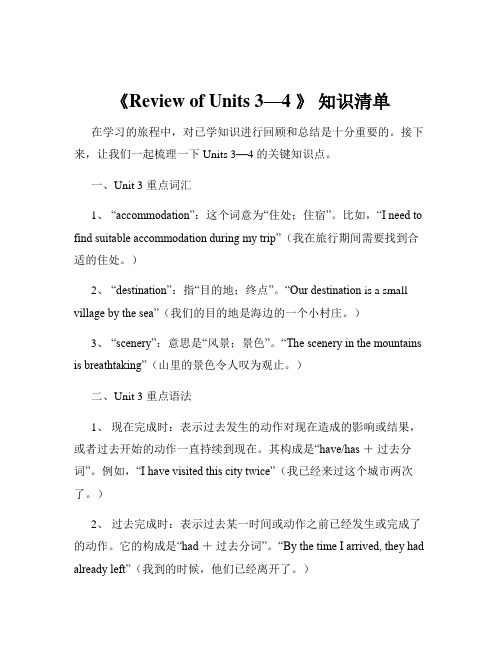
《Review of Units 3—4 》知识清单在学习的旅程中,对已学知识进行回顾和总结是十分重要的。
接下来,让我们一起梳理一下 Units 3—4 的关键知识点。
一、Unit 3 重点词汇1、“accommodation”:这个词意为“住处;住宿”。
比如,“I need to find suitable accommodation during my trip”(我在旅行期间需要找到合适的住处。
)2、“destination”:指“目的地;终点”。
“Our destination is a small village by the sea”(我们的目的地是海边的一个小村庄。
)3、“scenery”:意思是“风景;景色”。
“The scenery in the mountains is breathtaking”(山里的景色令人叹为观止。
)二、Unit 3 重点语法1、现在完成时:表示过去发生的动作对现在造成的影响或结果,或者过去开始的动作一直持续到现在。
其构成是“have/has +过去分词”。
例如,“I have visited this city twice”(我已经来过这个城市两次了。
)2、过去完成时:表示过去某一时间或动作之前已经发生或完成了的动作。
它的构成是“had +过去分词”。
“By the time I arrived, they had already left”(我到的时候,他们已经离开了。
)1、“It is + adj +for sb to do sth”:这个句型表示“对某人来说做某事是……的”。
例如,“It is difficult for me to learn a new language”(对我来说学习一门新语言很难。
)2、“The reason why is that”:“……的原因是……”。
“The reasonwhy I was late is that I missed the bus”(我迟到的原因是没赶上公交车。
阿斯顿新C10要点词汇语法
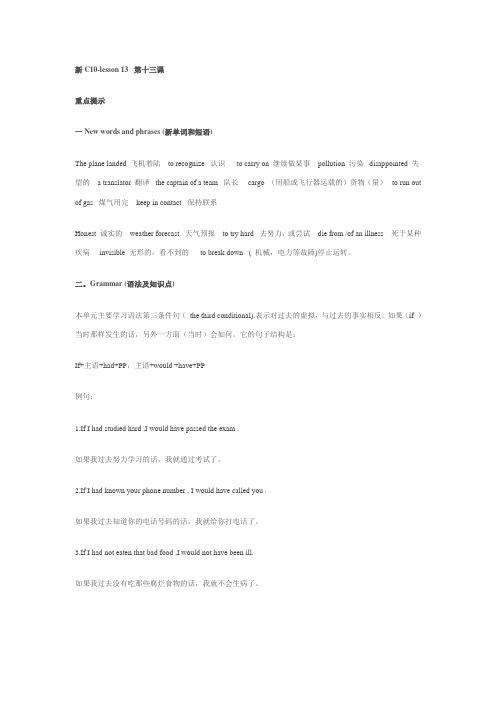
重点提示一New words and phrases (新单词和短语)The plane landed 飞机着陆to recognize 认识 to carry on 继续做某事pollution 污染disappointed 失望的 a translator 翻译the captain of a team 队长cargo (用船或飞行器运载的)货物(量)to run out of gas 煤气用完keep in contact 保持联系Honest 诚实的weather forecast 天气预报to try hard 去努力,或尝试die from /of an illness 死于某种疾病invisible 无形的,看不到的to break down ( 机械,电力等故障)停止运转。
二。
Grammar (语法及知识点)本单元主要学习语法第三条件句(the third conditional).表示对过去的虚拟,与过去的事实相反。
如果(if )当时那样发生的话,另外一方面(当时)会如何。
它的句子结构是:If+主语+had+PP,主语+would +have+PP例句:1.If I had studied hard ,I would have passed the exam .如果我过去努力学习的话,我就通过考试了。
2.If I had known your phone number , I would have called you .如果我过去知道你的电话号码的话,我就给你打电话了。
3.If I had not eaten that bad food ,I would not have been ill.如果我过去没有吃那些腐烂食物的话,我就不会生病了。
1.新单词:particularly特别地;instead 代替,反而;rescue营救短语:the minimum 最小量;to call an ambulance叫救护车;look on the internet上网查询;miss a goal失掉一分;a ticket inspector门票监察员;to oversleep睡过头;a job interview工作面试;a rough sea波涛汹涌的海to drop out of school辍学;to enter a competition进行比赛;2.重点句型+例句:本课主要学习条件句的用法,此语法问题在下面“3.语法点+例句”中有详细论述,在此暂不赘述。
专四语法(做完题总结)解读
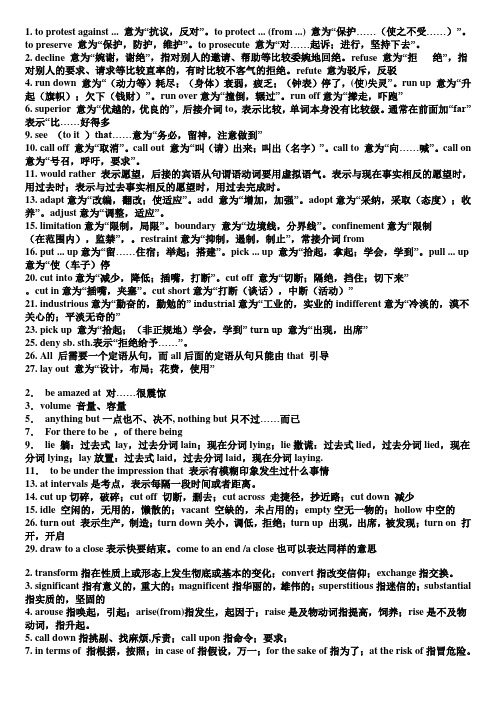
1. to protest against ... 意为“抗议,反对”。
to protect ... (from ...) 意为“保护……(使之不受……)”。
to preserve 意为“保护,防护,维护”。
to prosecute 意为“对……起诉;进行,坚持下去”。
2. decline 意为“婉谢,谢绝”,指对别人的邀请、帮助等比较委婉地回绝。
refuse 意为“拒绝”,指对别人的要求、请求等比较直率的,有时比较不客气的拒绝。
refute 意为驳斥,反驳4. run down 意为“(动力等)耗尽;(身体)衰弱,疲乏;(钟表)停了,(使)失灵”。
run up 意为“升起(旗帜);欠下(钱财)”。
run over意为“撞倒,辗过”。
run off意为“撵走,吓跑”6. superior 意为“优越的,优良的”,后接介词to,表示比较,单词本身没有比较级。
通常在前面加“far”表示“比……好得多9. see (to it )that……意为“务必,留神,注意做到”10. call off 意为“取消”。
call out 意为“叫(请)出来;叫出(名字)”。
call to 意为“向……喊”。
call on 意为“号召,呼吁,要求”。
11. would rather 表示愿望,后接的宾语从句谓语动词要用虚拟语气。
表示与现在事实相反的愿望时,用过去时;表示与过去事实相反的愿望时,用过去完成时。
13. adapt意为“改编,翻改;使适应”。
add 意为“增加,加强”。
adopt意为“采纳,采取(态度);收养”。
adjust意为“调整,适应”。
15. limitation意为“限制,局限”。
boundary 意为“边境线,分界线”。
confinement意为“限制(在范围内),监禁”,。
restraint意为“抑制,遏制,制止”,常接介词from16. put ... up意为“留……住宿;举起;搭建”。
think starter a1 unit4讲解

think starter a1 unit4讲解
"Starter A1 Unit 4"是英语学习者在初级水平的一个重要单元,主要讲解的是日常活动和计划。
这个单元的词汇和语法都与我们的日常生活密切相关,因此对于初学者来说,理解和掌握这个单元的内容非常重要。
我们会学习一些描述日常活动的词汇,如"get up", "have breakfast", "go to work/school"等。
这些词汇在我们的日常生活中非常常见,通过学习这些词汇,我们可以更好地表达我们的日常活动。
我们会学习一些描述计划和安排的词汇和句型,如"What are you going to do?", "I'm going to..."等。
这些词汇和句型可以帮助我们更好地规划我们的时间和活动。
我们还会学习一些基本的语法知识,如一般现在时的用法。
一般现在时是英语中最常用的时态之一,掌握好一般现在时的用法,可以帮助我们更准确地表达我们的意思。
"Starter A1 Unit 4"是一个非常实用的单元,通过学习这个单元的内容,我们可以更好地描述我们的日常生活和计划,也可以提高我们的英语水平。
高三英语必修四知识点总结

高三英语必修四知识点总结高三英语必修四是学生在高中阶段必须学习的一门课程,包括了一些重要的英语知识点和语言技能。
下面将对必修四的知识点进行总结,帮助学生复习和加深对知识的理解。
第一单元:A visit to heaven这一单元主要是学习文学作品《爱丽丝漫游奇境记》中的内容。
通过阅读并学习这一内容,学生可以了解到一些文学知识和语言技能。
1. 文学作品背景知识:学习了解《爱丽丝漫游奇境记》的作者、故事梗概、主要人物等内容。
这有助于学生了解这部英国文学经典作品的内容和意义。
2. 词汇学习:学习了解一些与故事内容相关的词汇,例如fantasy, adventure, curious, journey, impossible, dream等。
这有助于学生扩大词汇量,同时丰富了学生的词汇积累。
3. 语法知识:学习了解一些与故事内容相关的语法知识,例如被动语态、宾语从句、条件状语从句等。
这些语法知识是学习英语语言的基础,在阅读理解和写作中起到了重要的作用。
第二单元:Heroes这一单元主要是学习了解一些英雄的故事和传记,通过学习这些内容,学生可以加深了解英雄的特点以及英雄崇拜的意义。
1. 英雄故事知识:学习了解一些英雄的故事和传记,例如霍米洛斯、亚历山大大帝、伊斯坦布尔的征服者、红十字会的创立者等。
这有助于学生了解历史、人物以及一些历史事件的重要意义。
2. 词汇学习:学习了解一些与英雄相关的词汇,例如bravery, courage, determination, sacrifice等。
这些词汇能够帮助学生了解并描述英雄的特点和行为。
3. 语法知识:学习了解一些与英雄故事相关的语法知识,例如定语从句、名词性从句、比较级、虚拟语气等。
这些语法知识在写作和阅读中起到了一定的作用。
第三单元:Travel journal这一单元主要是学习了解旅行的相关内容,学生可以通过学习了解一些旅行者的日记和感受,了解旅行的特点和意义。
英语4知识点总结

英语4知识点总结In the English language, there is a Level 4 knowledge point that covers various aspects of grammar, vocabulary, and communication skills. In this summary, we will explore some of the key knowledge points at Level 4 to enhance the learners' understanding of the English language.1. GrammarAt Level 4, learners are expected to have a good grasp of different aspects of English grammar. This includes understanding sentence structure, tenses, parts of speech, and the use of articles, pronouns, and prepositions.i. Sentence Structure:Learners at Level 4 should be able to construct and identify different types of sentences such as simple, compound, complex, and compound-complex sentences. They should also understand the order of words in a sentence and how to form questions and negatives.ii. Tenses:Understanding and using different tenses is a crucial knowledge point at Level 4. Learners should be able to use the present, past, and future tenses in both simple and continuous forms. They should also understand the perfect tenses and how to use them in context.iii. Parts of Speech:At Level 4, learners should have a good understanding of the different parts of speech such as nouns, verbs, adjectives, adverbs, pronouns, and conjunctions. They should be able to identify and use these parts of speech correctly in sentences.iv. Articles, Pronouns, and Prepositions:Learners should understand the use of articles (a, an, the), pronouns (personal, possessive, reflexive), and prepositions in English. They should be able to use these words accurately in sentences and understand their role in forming coherent and meaningful sentences.2. VocabularyBuilding a strong vocabulary is an essential knowledge point at Level 4. Learners should be able to increase their word bank, understand word meanings, and use new words in context.i. Word Meanings:Learners should be able to understand the meanings of words by using context clues, dictionary definitions, and word families. They should be able to differentiate between synonyms, antonyms, and homonyms and use them appropriately in sentences.ii. Word Formation:At Level 4, learners should be familiar with word formation processes such as prefixes, suffixes, and compound words. They should be able to form new words by adding affixes or combining words to create meaningful vocabulary.iii. Idioms and Phrasal Verbs:Understanding idioms and phrasal verbs is another important knowledge point at Level 4. Learners should be able to recognize and use common idiomatic expressions and phrasal verbs in their speech and writing.iv. Collocations:Learners at Level 4 should be aware of collocations, which are words that are often used together. They should be able to use collocations naturally and accurately in context to improve fluency and language proficiency.3. Communication SkillsEffective communication is a crucial knowledge point at Level 4. Learners should be able to express themselves fluently, accurately, and confidently in both spoken and written English.i. Speaking Skills:Learners should be able to engage in conversations, discussions, and presentations with clarity and coherence. They should be able to express opinions, give reasons, and ask questions using appropriate language and intonation.ii. Listening Skills:At Level 4, learners should be able to understand different accents, identify main ideas, and grasp relevant details from a variety of listening materials such as lectures, interviews, and podcasts.iii. Reading Skills:Learners should be able to comprehend different types of texts, including narratives, articles, reports, and academic texts. They should be able to extract information, infer meaning, and analyze the content of the texts they read.iv. Writing Skills:Learners should be able to produce coherent and well-structured written texts such as essays, letters, reports, and narratives. They should be able to use appropriate language, grammar, and vocabulary to convey their ideas effectively.4. Cultural AwarenessAt Level 4, learners are encouraged to develop cultural awareness and sensitivity towards different English-speaking communities around the world. They should be able to understand and appreciate diverse customs, traditions, and communication styles.i. Multicultural Perspectives:Learners should be exposed to various cultural practices, traditions, and values from different English-speaking countries. This exposure helps them develop an open-minded approach and a better understanding of global diversity.ii. Cross-cultural Communication:Learners should be able to navigate communication challenges that arise from cultural differences. They should be aware of non-verbal communication cues, social norms, and etiquette in different cultural settings.iii. Cultural References in Language:At Level 4, learners should understand cultural references in English language and literature. They should be able to recognize allusions, metaphors, and symbols that reflect cultural concepts and beliefs.iv. Respect for Diversity:Learners should demonstrate respect for diversity and tolerance towards different cultural backgrounds. They should be able to engage in meaningful discussions about cultural issues and appreciate the richness of linguistic and cultural diversity.In conclusion, Level 4 knowledge points in English language learning cover various aspects of grammar, vocabulary, communication skills, and cultural awareness. By mastering these knowledge points, learners can enhance their proficiency and fluency in English, and develop a deeper appreciation for the language and its cultural significance.。
英语必修四知识点总结
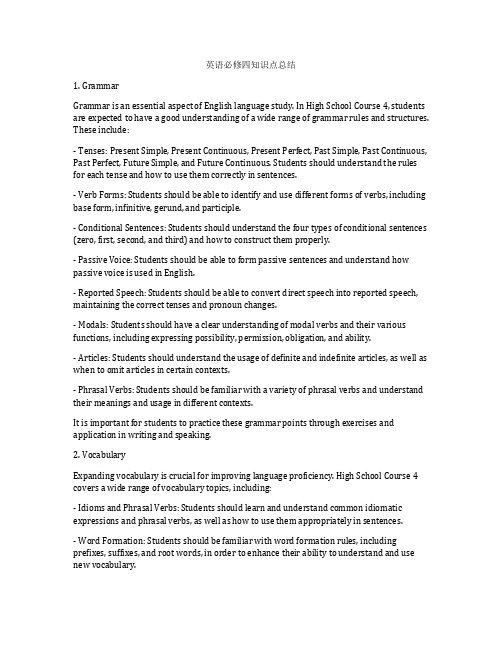
英语必修四知识点总结1. GrammarGrammar is an essential aspect of English language study. In High School Course 4, students are expected to have a good understanding of a wide range of grammar rules and structures. These include:- Tenses: Present Simple, Present Continuous, Present Perfect, Past Simple, Past Continuous, Past Perfect, Future Simple, and Future Continuous. Students should understand the rules for each tense and how to use them correctly in sentences.- Verb Forms: Students should be able to identify and use different forms of verbs, including base form, infinitive, gerund, and participle.- Conditional Sentences: Students should understand the four types of conditional sentences (zero, first, second, and third) and how to construct them properly.- Passive Voice: Students should be able to form passive sentences and understand how passive voice is used in English.- Reported Speech: Students should be able to convert direct speech into reported speech, maintaining the correct tenses and pronoun changes.- Modals: Students should have a clear understanding of modal verbs and their various functions, including expressing possibility, permission, obligation, and ability.- Articles: Students should understand the usage of definite and indefinite articles, as well as when to omit articles in certain contexts.- Phrasal Verbs: Students should be familiar with a variety of phrasal verbs and understand their meanings and usage in different contexts.It is important for students to practice these grammar points through exercises and application in writing and speaking.2. VocabularyExpanding vocabulary is crucial for improving language proficiency. High School Course 4 covers a wide range of vocabulary topics, including:- Idioms and Phrasal Verbs: Students should learn and understand common idiomatic expressions and phrasal verbs, as well as how to use them appropriately in sentences.- Word Formation: Students should be familiar with word formation rules, including prefixes, suffixes, and root words, in order to enhance their ability to understand and use new vocabulary.- Synonyms and Antonyms: Students should be able to identify synonyms and antonyms of key vocabulary words, as well as use them effectively in context.- Collocations: Students should learn common word combinations and collocations, as well as how to use them naturally in speech and writing.- Academic Vocabulary: Students should expand their academic vocabulary in various subjects, including science, history, literature, and social studies, in order to comprehend and discuss academic texts effectively.- Prefixes and Suffixes: Students should understand the meanings and functions of common prefixes and suffixes, and how they can change the meaning of a word.It is important for students to constantly build their vocabulary through reading, listening, and practice exercises.3. Reading ComprehensionHigh School Course 4 focuses on developing students' reading comprehension skills, including:- Understanding Main Ideas: Students should be able to identify the main idea of a text, as well as the supporting details and evidence provided.- Inference and Interpretation: Students should learn to make inferences based on the information presented in a text and interpret the author's intended meaning.- Textual Analysis: Students should be able to analyze the structure, tone, style, and language of different texts, including fiction, non-fiction, poetry, and academic writing.- Vocabulary in Context: Students should be able to use context clues to infer the meanings of unfamiliar words, as well as understand how vocabulary is used in different contexts.- Critical Thinking: Students should be able to critically evaluate and analyze texts, including identifying biases, assumptions, and logical fallacies.- Reading Strategies: Students should be familiar with different reading strategies, such as skimming, scanning, and close reading, and how to apply them effectively to different types of texts.4. Writing SkillsWriting skills are essential for effective communication in English. High School Course 4 covers a variety of writing genres and skills, including:- Essay Writing: Students should learn how to write different types of essays, including argumentative, persuasive, expository, and narrative essays, as well as how to structure and organize their ideas coherently.- Paragraph Writing: Students should be able to write well-structured paragraphs with clear topic sentences, supporting details, and a concluding sentence.- Formal and Informal Writing: Students should understand when to use formal and informal language, as well as how to adjust their writing style according to the audience and purpose of their writing.- Letter Writing: Students should learn how to write different types of letters, including formal letters, informal letters, and email messages, as well as how to address and format them appropriately.- Creative Writing: Students should be encouraged to engage in creative writing activities, including writing stories, poems, and personal narratives, in order to nurture their creativity and expression.- Editing and Proofreading: Students should learn how to revise, edit, and proofread their writing for clarity, coherence, grammar, and punctuation.5. Speaking and ListeningHigh School Course 4 emphasizes the development of oral communication and listening skills, including:- Speaking Fluency: Students should practice speaking English fluently and confidently, using appropriate pronunciation, intonation, and stress patterns.- Conversational Skills: Students should learn how to engage in meaningful conversations, including initiating and maintaining a conversation, asking questions, expressing opinions, and providing feedback.- Public Speaking: Students should have opportunities to develop public speaking skills, including delivering speeches, presentations, and debates, as well as how to use effective body language and vocal dynamics.- Listening Comprehension: Students should practice listening to a variety of spoken texts, including lectures, interviews, and conversations, and demonstrate their ability to comprehend main ideas, specific details, and implied meanings.- Note-taking: Students should learn how to take effective notes during listening activities, including using abbreviations, symbols, and keywords to summarize and retain information.It is important for students to actively participate in speaking and listening activities in order to improve their oral communication skills.In conclusion, High School Course 4 covers a wide range of knowledge points in English, including grammar, vocabulary, reading comprehension, writing skills, speaking, and listening. By mastering these key knowledge points, students can improve their overall English proficiency and become effective communicators in both academic and real-lifecontexts. It is recommended for students to engage in regular practice and application of the knowledge points, as well as seek feedback and support from their teachers and peers in order to make continuous progress in their English language learning journey.。
英语必修4知识点总结

英语必修4知识点总结IntroductionEnglish Compulsory 4 is a course designed for Chinese high school students to further develop their English language skills. It covers a wide range of topics including literature, grammar, vocabulary, and writing. In this summary, we will go over the key knowledge points in the English Compulsory 4 course, giving an overview of each topic and providing some tips for students to improve their English skills.LiteratureOne of the main focuses of English Compulsory 4 is literature. Students will study various literary works, including poems, short stories, and novels. They will learn to analyze and interpret the texts, paying attention to the author's use of language, structure, and literary devices.PoetryIn the poetry section, students will learn about different poetic forms and techniques such as rhyme, rhythm, and imagery. They will also study a selection of poems by famous poets such as William Shakespeare, Emily Dickinson, and Langston Hughes. Students will analyze the themes and meaning of the poems, and discuss how the poets use language to convey their messages.Short StoriesIn the short story section, students will read and analyze a number of short stories by renowned authors such as Edgar Allan Poe, Roald Dahl, and Agatha Christie. They will study the elements of fiction, including plot, character, setting, and theme, and learn how these elements work together to create a compelling story.NovelsIn the novel section, students will read a full-length novel and focus on the themes, characters, and narrative techniques used by the author. They will also analyze the social and historical context of the novel and discuss its relevance to contemporary issues.GrammarAnother important aspect of English Compulsory 4 is grammar. Students will review and expand their knowledge of English grammar, including tenses, modals, conditionals, and reported speech. They will also learn how to identify and correct common grammar mistakes such as subject-verb agreement, sentence fragments, and run-on sentences. VocabularyIn the vocabulary section, students will study a variety of words and phrases, including idioms, collocations, and phrasal verbs. They will learn how to use context clues to infer the meaning of unfamiliar words, as well as strategies for expanding their vocabulary through reading, writing, and word games.WritingThe writing component of English Compulsory 4 focuses on developing students' writing skills in both academic and creative contexts. Students will learn how to write essays, reports, and summaries, as well as creative pieces such as short stories and poems.Essay WritingIn the essay writing section, students will learn how to plan, organize, and write well-structured essays on a variety of topics. They will also study different types of essays, including argumentative, persuasive, and expository essays, and learn how to use evidence and examples to support their arguments.Report WritingIn the report writing section, students will learn how to write formal reports based on research and analysis. They will study the different sections of a report, such as the introduction, methodology, results, and conclusion, and learn how to use appropriate language and formatting.Summary WritingIn the summary writing section, students will learn how to condense and rephrase information from a passage, article, or speech. They will practice identifying the main ideas and supporting details, and learn how to present them concisely and accurately.Creative WritingIn the creative writing section, students will have the opportunity to explore their imagination and express their thoughts and feelings through poetry, short stories, and other creative forms of writing. They will learn how to use descriptive language, dialogue, and figurative language to create vivid and engaging narratives.Tips for Improving English SkillsIn addition to studying the key knowledge points outlined above, there are a number of tips for students to further improve their English language skills:1. Read widely and regularly. Reading is one of the best ways to improve vocabulary, grammar, and writing skills. Students should read a variety of texts, including novels, newspapers, magazines, and online articles, in order to expose themselves to different writing styles and genres.2. Practice writing. Writing regularly will help students become more comfortable with expressing their ideas and opinions in English. They should practice different types of writing, such as essays, reports, and creative pieces, and seek feedback from teachers, peers, or online resources.3. Listen and speak. Developing listening and speaking skills is essential for improving overall language proficiency. Students should listen to English audio materials, such as podcasts, interviews, and lectures, and practice speaking with classmates, teachers, or language exchange partners.4. Use technology. There are many online resources and language learning apps available that can help students practice grammar, vocabulary, and pronunciation. Students should take advantage of these tools to supplement their classroom learning and enhance their English skills.ConclusionEnglish Compulsory 4 is a comprehensive course that covers a wide range of topics and skills essential for students to develop their English language proficiency. By studying literature, grammar, vocabulary, and writing, and following the tips provided in this summary, students can enhance their English skills and become more confident and effective communicators in English.。
高中英语必修四学习知识点总结计划

欢迎使用,祝您学有所成。
第一元1〕achieve表示“完成,到达〞。
区 achieve,reach,gain:achieve 着重表示到达一定目的的程中所需要的技能,耐性和努力。
reach 指到达任何目、目的或指到达展程中的某个段。
gain 斗才到达所期望的目、或者有利地位。
2〕condition表示“条件〞,condition 数,表示人 / 物所的“状〞。
conditions 〔复数〕指一般情况,境。
in good/poor condition 状况好 / 不好。
out of condition 状况不好。
on condition that 在⋯⋯条件下,假使。
on no condition 决不。
3〕connection表示“ 接,关系〞。
connections 戚。
in connection with 与⋯⋯有关。
4〕behave表示“ 止,,行表〞。
behave oneself 表良好,行良好。
behave as起⋯⋯作用,表⋯⋯。
5〕worthwhile表示“ 得做的,得出力的〞。
句型 It is worhtwhile doing/to do sth干⋯⋯是“ 得的〞。
6〕observe表示“ 察,注意〞,可接省略 to 的不定式的复合构,当 observe 用被,其后的不定式回复 to。
observe 后也可接由在分构成的复合构。
后接 that 从句,表示“注意到,〞。
observe 可以表示“遵守,祝〞。
7〕respect作,后直接跟。
respect oneself 自重,自尊。
作名,表示“尊重,尊敬〞。
have/show respect for 意“ ⋯⋯尊重 / 尊敬〞。
have respect to 注意,考。
表示“敬意,候〞,用复数形式,常与give,send,pay 用。
in respect of sth 就某方面而言。
with respect to 涉及,关于。
8〕argue表示“争,〞。
ABC英语进阶英语重点总结(第四册)
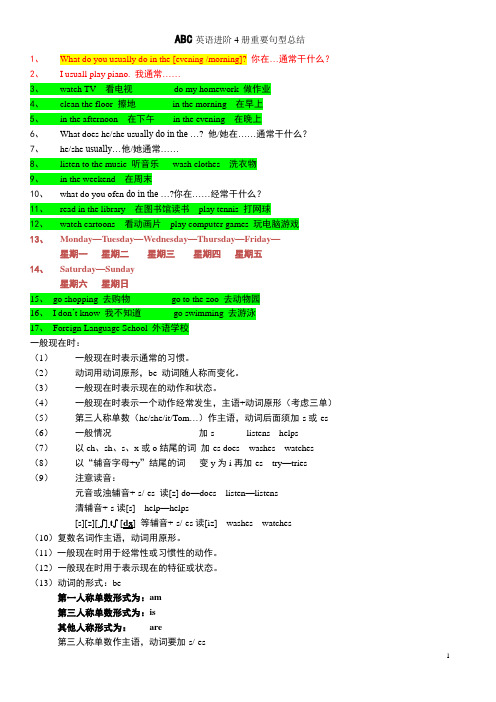
ABC英语进阶4册重要句型总结1、What do you usually do in the [evening /morning]? 你在…通常干什么?2、I usuall play piano. 我通常……3、watch TV 看电视do my homework 做作业4、clean the floor 擦地in the morning 在早上5、in the afternoon 在下午in the evening 在晚上6、What does he/she usua lly do in the …? 他/她在……通常干什么?7、he/she usually…他/她通常……8、listen to the music 听音乐wash clothes 洗衣物9、in the weekend 在周末10、what do you ofen do in the …?你在……经常干什么?11、read in the library 在图书馆读书play tennis 打网球12、watch cartoons 看动画片play computer games 玩电脑游戏13、Monday—Tuesday—Wednesday—Thursday—Friday—星期一星期二星期三星期四星期五14、Saturday—Sunday星期六星期日15、go shopping 去购物go to the zoo 去动物园16、I don’t know 我不知道go swimming 去游泳17、Foreign Language School 外语学校一般现在时:(1)一般现在时表示通常的习惯。
(2)动词用动词原形,be 动词随人称而变化。
(3)一般现在时表示现在的动作和状态。
(4)一般现在时表示一个动作经常发生,主语+动词原形(考虑三单)(5)第三人称单数(he/she/it/Tom…)作主语,动词后面须加-s或-es (6)一般情况加-s listens helps(7)以ch、sh、s、x或o结尾的词加-es does washes watches (8)以“辅音字母+y”结尾的词变y为i再加-es try—tries(9)注意读音:元音或浊辅音+-s/-es 读[z] do—does listen—listens清辅音+-s读[s] help—helps[s][z][ʃ] tʃ [dʒ] 等辅音+-s/-es读[iz] washes watches(10)复数名词作主语,动词用原形。
必修四英语单词及语言点总结

必修四英语单词及语言点总结1. 前言在英语学习的过程中,掌握单词是非常重要的一部分。
必修四是中学高中阶段的英语教材之一,其中涉及了许多重要的单词和语言点。
本文将对必修四中的英语单词及语言点进行总结和归纳,以便学生更好地掌握和运用。
2. 单词总结2.1. Module 1•ambition:雄心,抱负•reputation:声誉•interaction:互动•interaction skills:交流技巧•overseas:海外的•flexibility:灵活性•perspective:观点,看法•dedication:奉献,投入•destination:目的地•pursuit:追求2.2. Module 2•civilization:文明•navigation:航行,导航•technological:技术的•exploration:探索•commercial:商业的•encounter:遭遇,遇到•route:航线,路线•voyage of discovery:探险之旅•destination:目的地2.3. Module 3•steward:服务员,管家•hospitality:热情好客•multinational:跨国的•potential:潜力•productivity:生产力•crew:船员,机组人员•luxury:奢华•facilities:设施•hospitality industry:酒店业•communication skills:沟通技巧2.4. Module 4•revolution:革命•democracy:民主•constitution:宪法•equality:平等•liberty:自由•justice:正义•participate:参与•protest:抗议•civil rights:公民权利3. 语言点总结3.1. Module 1在Module 1中,我们主要学习了如何表达个人抱负和目标。
小四英语知识点总结

小四英语知识点总结GrammarGrammar is an important aspect of learning any language, including English. Small four learners need to understand the basic grammar rules in order to construct sentences properly. Some of the key grammar knowledge points for small four learners include:- Parts of speech: This includes understanding the different parts of speech such as nouns, pronouns, adjectives, verbs, adverbs, prepositions, conjunctions, and interjections.- Sentence structure: Small four learners need to understand the basic structure of a sentence, including subject-verb agreement and the use of articles.- Tenses: Small four learners need to understand the different tenses in English, including the simple present, simple past, simple future, present continuous, past continuous, and future continuous tenses.- Punctuation: Small four learners need to understand how to use punctuation marks such as periods, commas, question marks, exclamation marks, and apostrophes.VocabularyExpanding one's vocabulary is essential for becoming proficient in English. Small four learners should be exposed to a wide variety of vocabulary words and should be encouraged to learn new words regularly. Some key knowledge points for small four learners related to vocabulary include:- Everyday words: Small four learners should be familiar with everyday words used in common situations such as greetings, making requests, and expressing emotions.- Phrasal verbs: Small four learners should learn how to use phrasal verbs, which are a combination of a verb and a preposition or adverb. For example, "take off" and "go on."- Idioms: Small four learners should be exposed to common idiomatic expressions used in English and should understand their meanings. For example, "it's raining cats and dogs" means that it is raining heavily.- Synonyms and antonyms: Small four learners should understand the concept of synonyms (words with similar meanings) and antonyms (words with opposite meanings).Reading and WritingSmall four learners need to practice their reading and writing skills in order to improve their English proficiency. Some key knowledge points related to reading and writing for small four learners include:- Reading comprehension: Small four learners should be able to comprehend the main ideas and details of a text, as well as understand vocabulary in context.- Writing skills: Small four learners should be able to write simple sentences, paragraphs, and short compositions using correct grammar and vocabulary.- Spelling: Small four learners should practice spelling commonly-used words correctly and understand English spelling rules.- Handwriting: Small four learners should work on developing legible handwriting and understanding the correct formation of letters.Listening and SpeakingListening and speaking are important skills for small four learners to develop as they learn English. Some key knowledge points related to listening and speaking for small four learners include:- Listening comprehension: Small four learners should be able to understand spoken English in different contexts, such as conversations, instructions, and stories.- Speaking skills: Small four learners should be able to engage in basic conversations, ask and answer questions, and give simple presentations.- Pronunciation: Small four learners should work on pronouncing English words correctly and understanding the intonation patterns of the language.- Listening to various types of speech: Small four learners should be exposed to different accents and dialects in English to improve their listening comprehension skills.Cultural KnowledgeIn addition to language skills, small four learners should also be exposed to cultural knowledge related to English-speaking countries. Some key cultural knowledge points for small four learners include:- Holidays and traditions: Small four learners should learn about the holidays and traditions of English-speaking countries, such as Christmas, Thanksgiving, and Fourth of July.- Famous landmarks and attractions: Small four learners should be familiar with famous landmarks and attractions in English-speaking countries, such as the Statue of Liberty and Big Ben.- Cultural customs and norms: Small four learners should understand the cultural customs and norms of English-speaking countries, such as greetings, gestures, and social etiquette. - Important historical events: Small four learners should learn about important historical events in English-speaking countries, such as the American Revolution and World War II.Overall, small four learners need to gain a strong foundation in grammar, vocabulary, reading, writing, listening, speaking, and cultural knowledge in order to become proficient in English. By focusing on these key knowledge points, small four learners can develop their English skills and become confident and effective communicators in the language.。
高一英语必修四大纲知识重点归纳

高一英语必修四大纲知识重点归纳高考中,不会永远有人告知我们,竞争对手的实力和能力。
面对着四周越来越多的人,主动的摆正自己的学习的态度。
以下是我整理的有关高考考生必看的高一英语必修四知识点归纳,希望对您有所援助,望各位考生能够喜欢。
高一英语必修四知识点归纳11.基础梳理achievement Quaker welfare project institute specialist specialize chimp campaign connection landmine organization behave behavior shade move off worthwhile nest bond observe childhood outspoken respect argue entertainment lead a…life crowd crowd in inspire support look down on/upon refer audience by chance e aross career rate sickness intend emergency generation determination kindness considerate deliver carry on modest2.词语归纳1)achieve表示“完成,到达”。
区别achieve,reach,gain:achieve着重表示达到一定目的的过程中所需要的技能,耐性和努力。
reach指达到任何目标、目的或指达到发展过程中的某个阶段。
gain强调经过奋斗才达到所期望的目标、优势或者有利地位。
2)condition表示“条件”,condition为单数时,表示人/物所处的“状态”。
conditions(复数)指一般状况,环境。
in good/poor condition状况好/不好。
out of condition状况不好。
阿斯顿英语c3重点
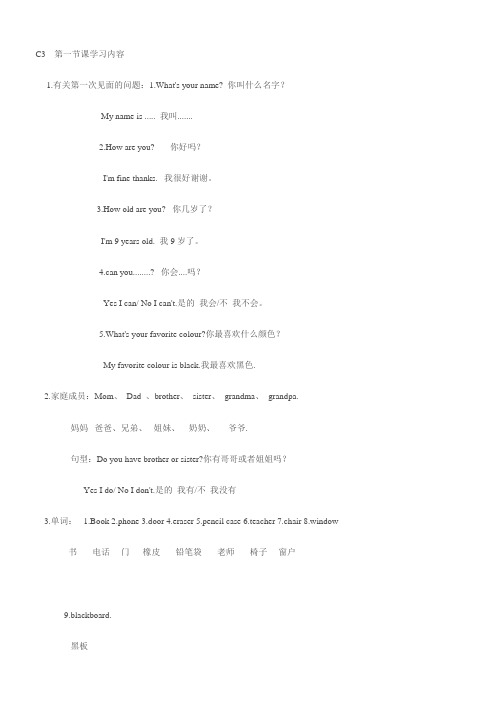
C3---第一节课学习内容1.有关第一次见面的问题:1.What's your name? 你叫什么名字?My name is ..... 我叫.......2.How are you? 你好吗?I'm fine thanks. 我很好谢谢。
3.How old are you? 你几岁了?I'm 9 years old. 我9岁了。
4.can you........? 你会....吗?Yes I can/ No I can't.是的我会/不我不会。
5.What's your favorite colour?你最喜欢什么颜色?My favorite colour is black.我最喜欢黑色.2.家庭成员:Mom、Dad 、brother、sister、grandma、grandpa.妈妈爸爸、兄弟、姐妹、奶奶、爷爷.句型:Do you have brother or sister?你有哥哥或者姐姐吗?Yes I do/ No I don't.是的我有/不我没有3.单词: 1.Book 2.phone 3.door4.eraser5.pencil case6.teacher7.chair8.window书电话门橡皮铅笔袋老师椅子窗户9.blackboard.黑板C3学习重点第二课Review: Can you .....? 你能(做)......吗?复习:Yes I can/No I can't. 是的,我能/不,我不能.Introduce: Can I .......? 我能(做)......吗?新内容: Yes you can/ No you can't. 是的,你能/不,你不能eg: Can I go to the bathroom? 我能去洗手间吗?例如: Yes you can/ No you can't. 是,你能/不,你不能.sentense: You can ......... 你可以做.......句型: You can't........ 你不可以做......1.read 读2.get a pen 拿一个笔3.speak 说4.write 写5.open your book 打开课本6.close your book 合上课本7.stand up 站起来8.sit down 坐下9.clap your hands 鼓掌10.make a circle 围成一个圈11.be quiet 安静12.listen 听C3---第三节课学习内容一:表示频率的单词: 1. Never 从不2. Sometimes 有时候3. Often 经常4. Usually 通常5. Every day 每天6. Always 一直,总是句型:How often do you......? 你多长时间(做)一次......例句:How often do you swim? 你多长时间游一次泳?I sometimes swim. 我有时候游泳.注:在表示频率的单词中所有的单词除了Everyday之外都放在句子的当中,Everyday放在句子的末尾.例如:I often watch Tv. 我经常看电视.I watch Tv everyday. 我每天看电视.: play tennis 打网球play football 踢足球play table tennis 打乒乓球play basketball 打篮球go to the supermarket 去超市注:在这一节课中要求学生不但会回答问题还要会问问题.C3---第四节课学习重点介词 : 1.on 上面2.In 里面3.under 下面4.next to 旁边5.In front of 前面6.behind 后面7.between 中间8.left 左边9.right 右边句型 : 1.where is the frog? 青蛙在哪里?The frog is on the left of the box.青蛙在箱子的左边. 单词: bed 床picture 图画clock 钟表window 窗户chair 椅子armchair 扶手椅sofa 沙发table 桌子lamp 台灯mirror 镜子句型:There is..... 有一个.......(注:用于单数)There are...... 有几个.......(注:用于复数)C3---第五课学习主要内容1.Review: on in under next to behind.In front of.between.Left.right.(复习)(中间)c3---第六课学习主要内容2.新内容:1.food / drink (注:课本第19页,注意单复数的变化,喝的东西都部加S。
阿斯顿英语重点c2

C2---第一节课学习主要内容句型:1.what's your name? 你叫什么名字?My name is .... 我的名在叫....2.who are you? 你是谁?I'm.... 我是...3.How are you? 你好吗?I'm fine thanks. 我很好谢谢.4.Who is she/he ? 她/他是谁?She/he is .... 她/他是...5.Who are they ? 他们是谁?They are..and... 他们是...和...单词a house 房子 a television 电视机 a bed 床 a boy 男孩a monkey 猴子 an umbrella 伞 a sheep 羊 an egg 鸡蛋句型: What is it? It'a/an.....C2---第二节课学习主要内容1.crocodile 鳄鱼2.giraffe 长颈鹿3.dragon 龙4.elephant 大象5.monkey 猴子6.snake 蛇7.tiger 老虎 8.bird 鸟 9.frog 青蛙10.dog 狗 11.cat 猫句型: 1.what is it? 它是什么?(注:表示问的是一个)It's a/an..... 它是....2.what are they? 它们是什么?(注:这里问的是几个)They are.....s. 它们是..... (注:复数需要加S)3. Is it a......? 它是...吗?Yes it is./ No it isn't. 是的它是/不它不是4. Are they.....? 它们是...吗?Yes they are/ No they aren't. 是它是/不它不是.C2---第三节课学习主要内容1. head 脑袋2. eye 眼睛3. nose 鼻子4.ear 耳朵5.mouth 嘴6. hair 头发7. neck 脖子8. shoulder 肩膀9. arm 胳膊 10. hand 手11. finger 手指12. thumb 大拇指13. leg 腿14. knee 膝盖15. foot 脚注:在身体部位这些单词中复数都是在单词后面加上S,但是脚foot它的复数是feet.句型:1. How many ....s do you have ? 你有多少个...?I have __ ___. 我有.....eg: 2. How many eyes do you have? 你有几个眼睛?例句:I have 2 eyes. 我有2个眼睛.难点:3. How many ....s does he/she have? 他/她有几个眼睛?He/she has.... 他/她有....eg: 4. How many eyes does he/she have? 她/他有几个眼睛?例句:He/she has2 eyes. 她/他有2个眼睛.注:在这一部分中学生经常把我有和她/他有弄混了。
阿斯顿英语每课学习重点
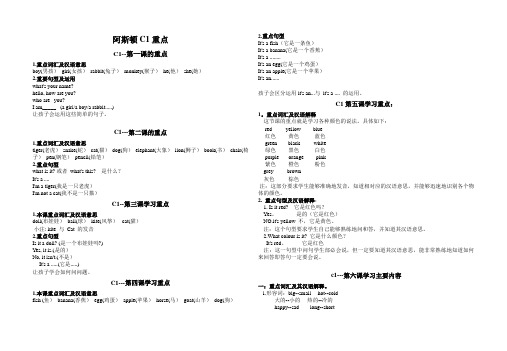
阿斯顿C1重点C1--第一课的重点1.重点词汇及汉语意思boy(男孩)girl(女孩)rabbit(兔子)monkey(猴子)he(他)she(她)2.重要句型及运用what's your name?hello, how are you?who are you?I am_____ (a girl/a boy/a rabbit.....)让孩子会运用这些简单的句子。
C1---第二课的重点1.重点词汇及汉语意思tiger(老虎)snake(蛇)cat(猫)dog(狗)elephant(大象)lion(狮子)book(书)chair(椅子)pen(钢笔)pencil(铅笔)2.重点句型what is it? 或者what's this? 是什么?It's a ....I'm a tiger(我是一只老虎)I'm not a cat(我不是一只猫)C1--第三课学习重点1.本课重点词汇及汉语意思doll(布娃娃)ball(球)kite(风筝)cat(猫)小注: kite 与Cat 的发音2.重点句型Is it a doll? (是一个布娃娃吗?)Yes, it is.(是的)No, it isn't.(不是)It's a .....(它是.....)让孩子学会如何问问题。
C1---第四课学习重点1.本课重点词汇及汉语意思fish (鱼)banana(香蕉)egg(鸡蛋)apple(苹果)horse(马)goat(山羊)dog(狗)2.重点句型It's a fish(它是一条鱼)It's a banana(它是一个香蕉)It's a ........It's an egg(它是一个鸡蛋)It's an apple(它是一个苹果)It's an......孩子会区分运用it's an...与it's a .... 的运用。
阿斯顿英语C5级别学习重点

C5---第一课学习重点一. 词汇:1. Days of the week星期Monday星期一Tuesday星期二Wednesday星期三Thursday星期四Friday星期五Saturday星期六Sunday星期日2. Month月份January一月February二月March三月April四月May五月June六月July七月August八月September九月October十月November十一月December十二月3. 其他balcony阳台cousin表兄弟姐妹 a bowl of fruits一碗水果a bowl of...一碗... a plate of ...一盘子...二. 句型:1.How are you? = How are you doing? 你好吗?I'm fine/happy/ok/not bad.2.How old are you? 你多大了?I'm ten years old.3. Where do you live? 你在哪儿住?I live in Jinan.4.When is you birthday? 你生日是什么时候?My birthday is in June.5.What day is today? 今天星期几?It's Saturday.可能还要延伸为:What day is tomorrow? 明天星期几?It's Sunday.本节课需要学生能掌握这些简单的对话。
C5---第二课学习重点一. 词汇:city城市newspaper报纸of course当然了take the bus坐公交车watch movies看电影clown小丑watch sport看体育赛interesting有趣的museum博物馆stadium体育馆movie theater电影院circus马戏团quarter一刻钟half半点二. 句型:(telling the time 时间的表达)1. 整点:7:00 seven o'clock (只有在整点的后面才能用o'clock)2. 几点一刻:7:15 Quarter past(过)seven3. 差一刻几点:7:45 Quarter to (差)eight4. 几点半:7:30 Half past(过)sevenpast 与to 的区别:在表达几点过几分的时候要用past;如果想表达差几分到一个整点的时候要用to;无论差还是过的时间最多不能超过半小时。
- 1、下载文档前请自行甄别文档内容的完整性,平台不提供额外的编辑、内容补充、找答案等附加服务。
- 2、"仅部分预览"的文档,不可在线预览部分如存在完整性等问题,可反馈申请退款(可完整预览的文档不适用该条件!)。
- 3、如文档侵犯您的权益,请联系客服反馈,我们会尽快为您处理(人工客服工作时间:9:00-18:30)。
C4A---第一课学习重点一. 词汇:序数词:First 1st second 2nd third 3rd fourth 4th fifth 5th sixth 6th seventh 7th eighth 8th ninth 9thtwins 双胞胎apartment 公寓elevator电梯balcony 阳台favorite最喜欢的by bus乘公共汽车near the sea 靠近海work with a computer 用电脑工作lots of 很多二. 语法及语言点:能对询问自己的一些问句做出正确的表达,如自己的姓名,年龄,喜好等:1. Who are you? /What’s your name?你叫什么名字?--I’m Kate.我叫Kate。
2. ---How old are you? 你多大了?--I’m 8.我8岁了。
3. ---What food do you like?你喜欢什么食品?---I like rice and vegetables. 我喜欢米饭和蔬菜。
4. What do you usually have for breakfast? 你早饭通常吃什么?5. ---How do you go to school? 你怎么去上学?---I go to school by bus. 我乘坐公共汽车去上学。
6. ---What’s your favorite subject? 你最喜欢的科目是什么?---My favorite subject is English. 我最喜欢的科目是英语。
7. ---Which floor do you live on? 你住在几楼?---I live on the second floor. 我住在二楼。
8. ---What do you like doing after school? 放学后你喜欢干什么?---I like playing football after school. 放学后我喜欢踢足球。
C4A---第二课学习重点一. 词汇:mine我的yours你的his他的hers她的ours我们的theirs他们的take a bus 乘公共汽车hurry up 快点have breakfast吃早饭wake up 醒来get up 起床clean one’s teeth 刷牙get to school 到学校wash one’s face洗脸get dressed 穿衣服二. 语法及语言点:1 This is my book.这是我的书。
=This book is mine. 这本书是我的。
在此句中mine=my book,所以以上两句意思相同。
2 yours,his,hers,ours,theirs 也是一样的用法,如:A : This is your sweater. 这是你的毛衣。
=This sweater is yours. 这件毛衣是你的。
B: Is this her bag? 这是她的包吗?=Is this bag hers? 这个包是她的吗?C: Is this our classroom? 这是我们的教室吗?=Is this classroom ours? 这个教室是我们的吗?D: That is their classroom. 那是他们的教室。
=That classroom is theirs. 那间教室是他们的。
E: This is his ball.这是他的球。
=This ball is his. 这个球是他的。
三. 句型:Is this hat yours? No, it’s not mine.It’s his.这顶帽子是你的吗?不是我的。
是他的Are those flowers theirs? No, they aren’t theirs. They’re Clare’s flowers.那些花是他们的吗?不是他们的。
是Clare的。
C4A---第三课学习重点一. 词汇:right now 现在with(介词)和…island 岛屿,小岛trip 旅游,旅行visit 参观by boat 坐船cookies 甜饼干soda 苏打水picnic 野餐二.语法及语言点:本课主要内容为由“wh”组成的特殊疑问词引导的疑问句,表示将要做或将来要发生的事情,由“be(am,is,are) going to...”引导。
1. where在哪里,用来询问地点。
Where are you going to go? 你要去哪儿?I’m going to go to the park.我将要去公园。
2. When(什么时候),用来询问时间。
When are they going to go? 他们什么时候去?They are going to go tomorrow. 他们将明天去。
3. what什么,用来询问信息 What day is it? 今天星期几?It’s Saturday.4. Why 为什么,问事情的原因。
Why do they take a boat? 他们为什么乘船去?Because they want to see the island. 因为他们想看岛屿。
5.Which(哪一个),表示几者之间所选择的一个。
Which street do you live on? 你住在哪条街上?6.Who谁,用来询问人。
Who does professor Smart live with? Smart教授和谁一起住?He lives with Polly. 他和Polly一起住。
7.How 怎么样(表示方式)?或情况怎么样。
How do you go to school? 你怎么上学?How old are you? 你多大了?C4A---第四课学习重点一. 词汇:time 时间machine 机器clock 钟表quarter一刻钟hand指针go back 回去ten o’clock 十点钟half past ten 十点半quarter past ten 十点一刻quarter to ten 差一刻到十点即九点四十五at night 在夜晚in the morning 在上午in the afternoon 在下午in the evening 在傍晚table tennis competition 乒乓球比赛running race 赛跑比赛swimming race游泳比赛jumping competition 跳跃比赛three legged race 三足比赛二. 语法及语言点:本课主要学习时间的表达:1. 整点用o’clock表达,如It’s 7 o’clock. 现在七点钟。
2. 半点用half past 表达,如It’s half past ten.现在十点半。
3. 整点过一刻钟用quarter past 表达,如,It’s quarter past one. 现在一点一刻即一点十五。
4. 差一刻到几点用quarter to 表达,如,It’s quarter to two.差一刻到两点即一点四十五。
5. 询问时间时用句型What time is it? It’s...6. 复习一般过去时一般疑问句。
-Did you make this machine? 这是你制作的机器吗?-Yes, I did. 是的,是我制作的。
C4A---第五课学习重点一. 单词和短语:quarter一刻钟,十五分钟machine 机器lunch 午饭breakfast 早餐dinner 晚餐island 小岛get to work 上班get dressed 穿衣服have breakfast 吃早饭have lunch 吃午饭finish work 下班have dinner 吃晚饭go for a walk 散步security 安全go to bed 上床睡觉wake up 醒来get up 起床二. 语法及语言点:1. 时间的识别及正确的英文表达,可分四种情况:(1)整点:o’clock 3 点:three o’clock(2)半点:half 3点半:half past three(3)分针未过半点:用past 来表示。
例如:3点10分,10 past three (4)分针过了半点:用to 来表示。
例如:3点40分,20 to four2. 正确分清及表达平时在什么时间做什么事情。
例如:What time do you usually get up? 你通常几点钟起床?I usually get up at half past six. 我通常在6:30 起床。
3.表示在几点钟通常用介词at。
例如:I go to school at seven o’clock.我七点钟去上学。
I go to bed at eight o’clock at night.我晚上八点钟睡觉。
三. 句型:What time do you get up? 你几点起床?What time do you leave home? 你几点离开家?What time do you get to school? 你几点到学校?What time do you have lunch? 你几点吃午饭?What time do you finish school? 你几点放学?What time do you go to bed? 你几点上床睡觉?C4A---第六课(复习课)学习重点一. 复习以what, what time, how, which,who, why 和where引导的特殊疑问句:Who do you live with?What is your favorite sport?How do you go to school?Which street do you live on?What time do you get up?Why is it your favorite sport?Where do you live?二. 物主代词:形容词性物主代词:my,your,his,her,its,our,their。
名词性物主代词:mine,yours,his,hers,its,ours,theirs。
三. 短语和词组:wake up,get up,have breakfast,clean your teeth,leave the house,wait for the bus,get on the bus,have your first lesson of the day,have lunch,have your afternoon lessons, take the bus home,have dinner,get undressed,get into bed,go to sleep。
